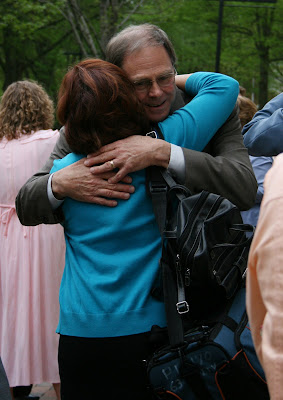
The crisis simulation will always be one of my favorite memories at Elon. I have always wanted to take part in a Model United Nations simulation and I’m so glad that I had the opportunity to do so with International Relations. Representing Israel was something that any IR student should want. Israel plays such a prominent role in international politics today and because of the crisis simulation, I have a stronger understanding of the state and will be able to follow the news with much more interest and understanding than before.
Overall, my cabinet worked very well together. We were diplomatic about decisions and handled every crisis with a good sense of judgment (and sense of humor when necessary). We were very conscientious about addressing everything that popped up on the newsfeed. It was important to us to not ignore any problem that may have had any kind of affect on Israel. No matter what someone’s position in the cabinet, we all contributed. Some cabinet positions were more crucial than others, such as the ministers of defense and foreign affairs, but they did not have to do an overwhelming amount of work more than the other cabinet members.
I think that my role as Minister of Communications and as a general participant in the simulation was crucial. Going into the crisis, I knew that I could and that wanted to contribute a significant amount, but I was afraid that my cabinet position would not allow me to take on as much as I had hoped. But this was an unnecessary concern because I was able to write a number of press releases and help a lot with other crises that called for attention.
The first action order of the crisis was a press release that I wrote. It was level 3 priority (out of 5) and addressed Israel’s support of the efforts being made by the Kuwaiti national assembly toward democracy. It was important to announce our support in order to boost our own international identity as a democracy-supporting state. My favorite contribution was a press release announcing “Jewbilation,” a celebration of the Jewish culture that would serve as a fundraiser to combat the recent Israeli debt rumors created by the BBC.
On the second day of the crisis, the crisis staff wanted to kick Israel’s cabinet out of government because we were accomplishing too much. I used my cabinet minister’s party affiliation to our benefit and wrote a press release announcing that I spoke with my fellow members of the Likud Party in the Knesset and swayed their votes to keep us in the cabinet. The idea worked perfectly and the crisis staff could not reject our plan. I also helped with the decision to create a statue in honor of the newly formed peace between Israel and Palestine.
Even after reading and researching Israel for weeks, I still learned new things about its internal struggles, external dilemmas and position within the world of international relations.
As the first day progressed, I became more assertive and added my opinions and contributed more. I became more comfortable in my belief that I had something of value to contribute, so I decided to express it more often. I realized, especially after my first couple of ideas were successful, that nothing is too outlandish. If I wanted to make something happen, it could happen and result in success for our nation.
At the beginning of the crisis, we outlined our highest priorities for the simulation. Our number one goal was nuclear non-proliferation in Iran. From there, we learned about Gilad Shalit, a prized Israeli solider who was captured by the Palestinians in 2006, and how it is very important that we get him back. Recovering him became our number two priority along with improving our international reputation. Creating peace between Israel and Palestine peace was number three. From there, a number of internal problems were on our list. Throughout the simulation, we made sure to hit all those points and address the concerns raised by other countries. In doing so, I learned a lot more about the Middle East and how each country interacts with one another.


